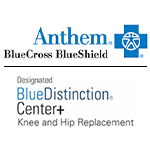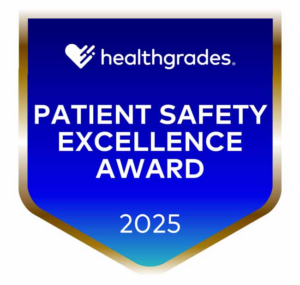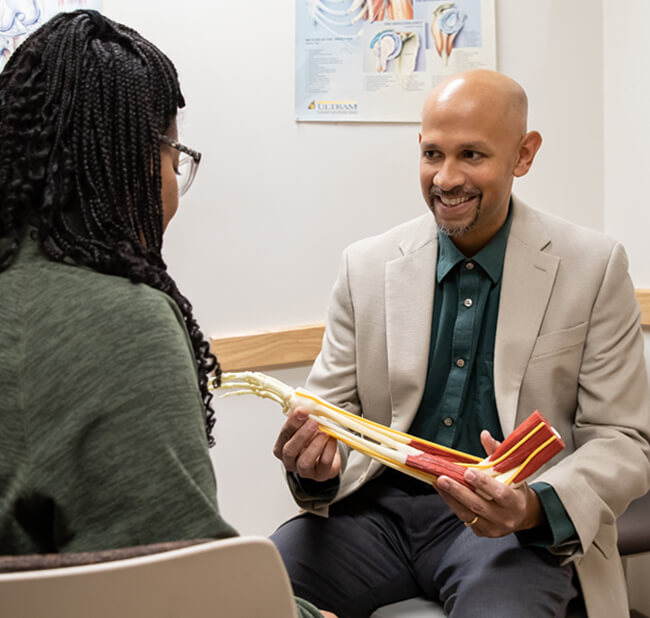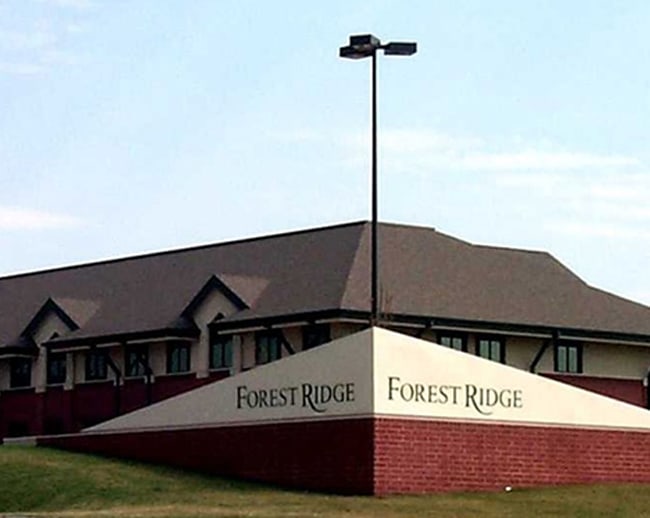Hand & finger
Functioning fingers and hands are necessary for everyday life, so when something goes wrong, it can stop your life in its tracks. You may be able to adapt for a time, but that can cause further damage and pain. Instead, turn to the experts at Henry County Center for Orthopedic Surgery and Sports Medicine to help you make a change.
Designations
- Anthem Blue Cross and Blue Shield-designated Blue Distinction Center for knee and hip replacements
- Top 5% in the nation by Healthgrades™ for Outpatient Orthopedic Surgery
- CHIME Digital Health Most Wired Awards, Acute & Ambulatory, 2020–2024
- Healthgrades 2025 Patient Safety Excellence Award™





Conditions
 There are several conditions that can affect your fingers and hands, but here are a few ongoing conditions that may require specialized medical intervention:
There are several conditions that can affect your fingers and hands, but here are a few ongoing conditions that may require specialized medical intervention:
- Arthritis: osteoarthritis and rheumatoid disease
- Carpal tunnel
- Cubital tunnel
- De Quervian tenosynovitis
- Dupuytren contracture
- Fractures
- Ganglion cysts
- Sprains
- Trigger finger
Hand & finger treatments
Although many hand and finger conditions may not directly cause pain, they can create problems in your daily life. Constant disruptions add up, and there are plenty of treatment options to bring back your regular function:
- Activity modifications
- Anti-inflammatory medications
- Aspiration (fluid removal) of ganglion cysts
- Braces
- Collagenase enzyme injections
- Ergonomic adaptive devices
- Hand therapy exercises
- Joint fusion (arthrodesis)
- Joint replacement (arthroplasty)
- Joint sleeves/padding
- Open excision of the cords (fasciectomy) from Dupuytren contracture
- Percutaneous needle release (fasciotomy) of cords from Dupuytren contracture
- Splinting
- Steroid injections
- Surgery
The best way to figure out what treatment plan will work for you is to consult a specialist at Henry County Center for Orthopedic Surgery and Sports Medicine. We are ready to help you take back your hand and finger function.
FAQs about hand and finger treatments
Time of recovery is dependent on what type of procedure you have. You may need a splint and or brace after surgery as well as several weeks of therapy. In other cases, you may just need time for your incision to heal and be back to regular activities in a few weeks.
While we are a surgical specialty, surgery is not always the only option. A lot of patients notice improvement in symptoms and daily function with conservative treatments. These may include rest, splints/bracing, ice, heat, anti-inflammatory medications, exercises, therapy, and steroid injections.
When it comes to treating arthritis, the goal is to decrease painful inflammation and to improve overall function. There are conservative options such as ice, heat, bracing, and exercises. We also offer steroid injections for arthritic joint spaces to decrease pain. Ultimately, if these treatment options do not relieve pain or improve your overall function, we do offer surgical treatments such as removing the arthritic bone/joint space, fusions, and more.
Signs of a serious hand injury include severe bleeding, significant deformity, loss of sensation, and compartment syndrome symptoms like intense pain and swelling. Seek medical attention immediately if you experience these symptoms.
You should see a doctor if you have severe pain, visible bone deformity, numbness/tingling, open wounds, or the inability to move your fingers.
Hand & finger provider
Locations
Call to schedule an appointment at which location is closest to you.

Henry County Center for Orthopedic Surgery and Sports Medicine
Suite 240
New Castle, IN 47362


